Are you interested in keeping your pool water warm all year round, even in colder weather? If so, a pool heater might be the perfect solution for you. A few things to consider when choosing a pool heater are the type of power needed (gas, electric, or solar) and the initial and long-term installation and maintenance costs.
Electric pool heaters are generally easy to set up and more sustainable. In contrast, gas pool heaters heat up quickly but are inefficient and have a shorter lifespan than electric heat pumps. Solar pool heaters are the most environmentally friendly option. If you're unsure which option is best for you, read more about the different power sources at the bottom of this guide.
Pool heaters are measured in British Thermal Units (BTU), and a higher number indicates a more powerful heater that can warm up your pool more quickly. A high BTU measurement and low weight can simplify installation for those on a budget.
If you're looking for the best pool heaters, you can expect extra features such as solar panels to minimize environmental impact, reduce energy bills, and precise digital temperature controls.
While the best pool heaters aren't cheap, they can extend the use of your pool and bring many extra months of enjoyment. If you don’t have a swimming pool but like a dip, check out the best hot tubs and swim spas instead.
The best pool heaters we recommend in 2025
Why you can trust Top Ten Reviews Our expert reviewers spend hours testing and comparing products and services so you can choose the best for you. Find out more about how we test.
We've rounded up the best pool heaters you can currently buy. While we endeavor to review every product we highlight in our guides, the pool heaters we've featured here are still being tested. However, to help you make the best decision for you and your pool, we've collated the key specs and features you need to know—plus, we've summed up user reviews to help you make the right purchasing decision.
The best pool heater overall
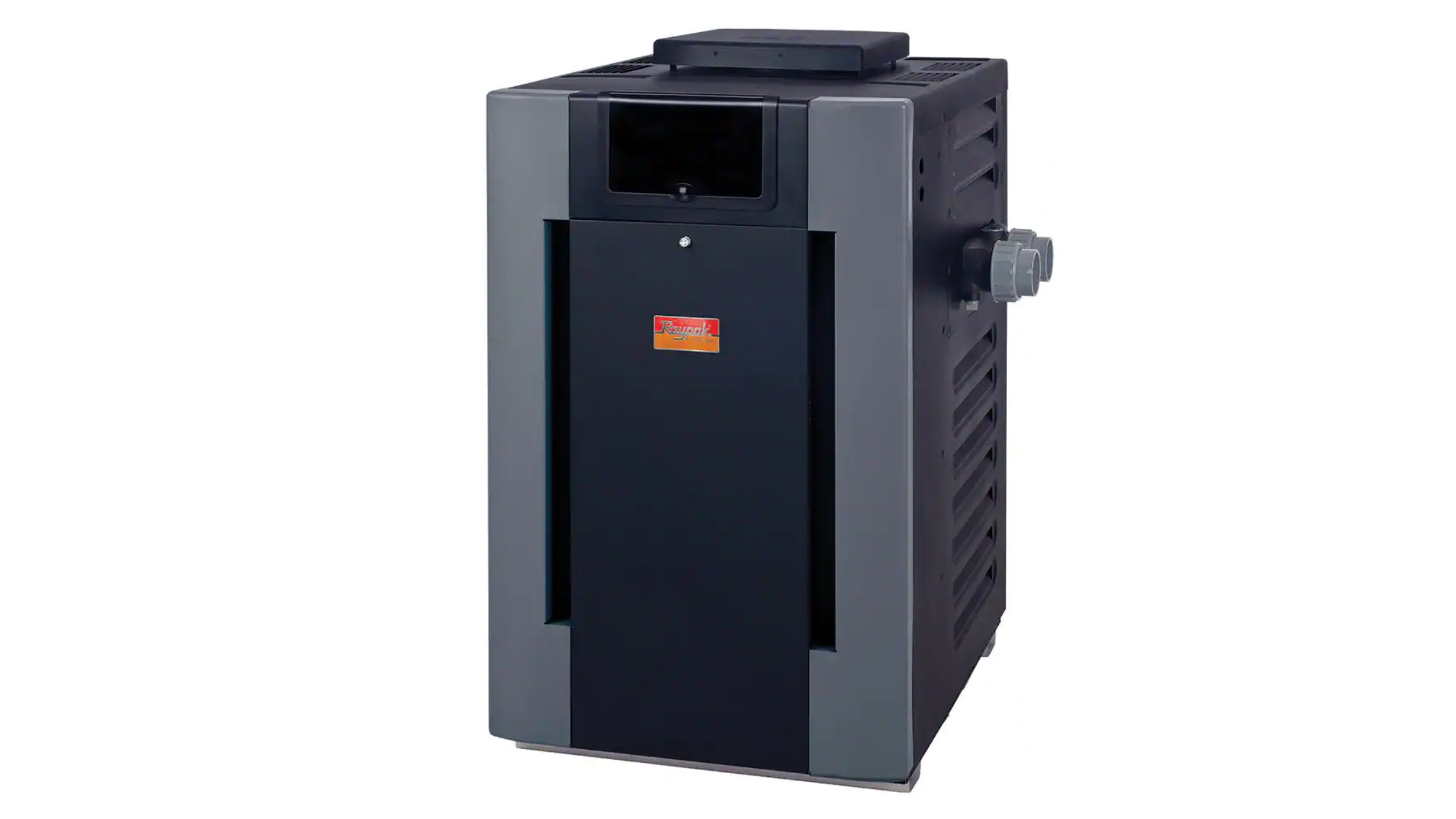
This well-specced Raypak heater is full of technology designed to help keep your pool or spa waters perfect all year. Unlike cheaper heaters on the market, it has a digital control panel with an LCD so that you can precisely read the temperature, and this has a cover to keep it protected from the elements. The unit is built to withstand the weather in other ways, too. The copper heat exchanger and cabinet are designed to withstand corrosion, prolonging the unit's life. Raypak also backs this up with a two-year warranty.
The Raypak PR266AENC50 gets an impressive 4.7 out of 5 stars on the Home Depot website, with 100% of users saying they’d recommend it. While users did “warn” about its very heavy weight and that you need a licensed electrician to get it up and running, there were very few complaints about its performance once installed. Importantly, users said that it was fast and efficient when it came to raising the water temperature.
Design-wise, this unit isn’t exactly a beauty, but a pool heater is made for functionality and tends to be tucked away where you can’t see it. It’s also a heavy beast at 220 pounds, but this shouldn’t cause a problem other than transporting it to your pool.
The Raypak PR266AENC5 is a natural gas electronic ignition heater that must be placed above or at ground level. The manufacturer recommends professional installation by a licensed plumber, and while most reviewers agreed, they added that this wasn’t a complicated job.
It packs an impressive 266,000 BTU of power, higher than most other heaters in our guide. This means it can raise the water temperature more quickly and keep it warm. If you’ve got a larger pool to heat, a larger budget, and a suitable gas connection, the Raypak PR266AENC5 is one of the best pool heaters you can buy.
The best solar-powered pool heater
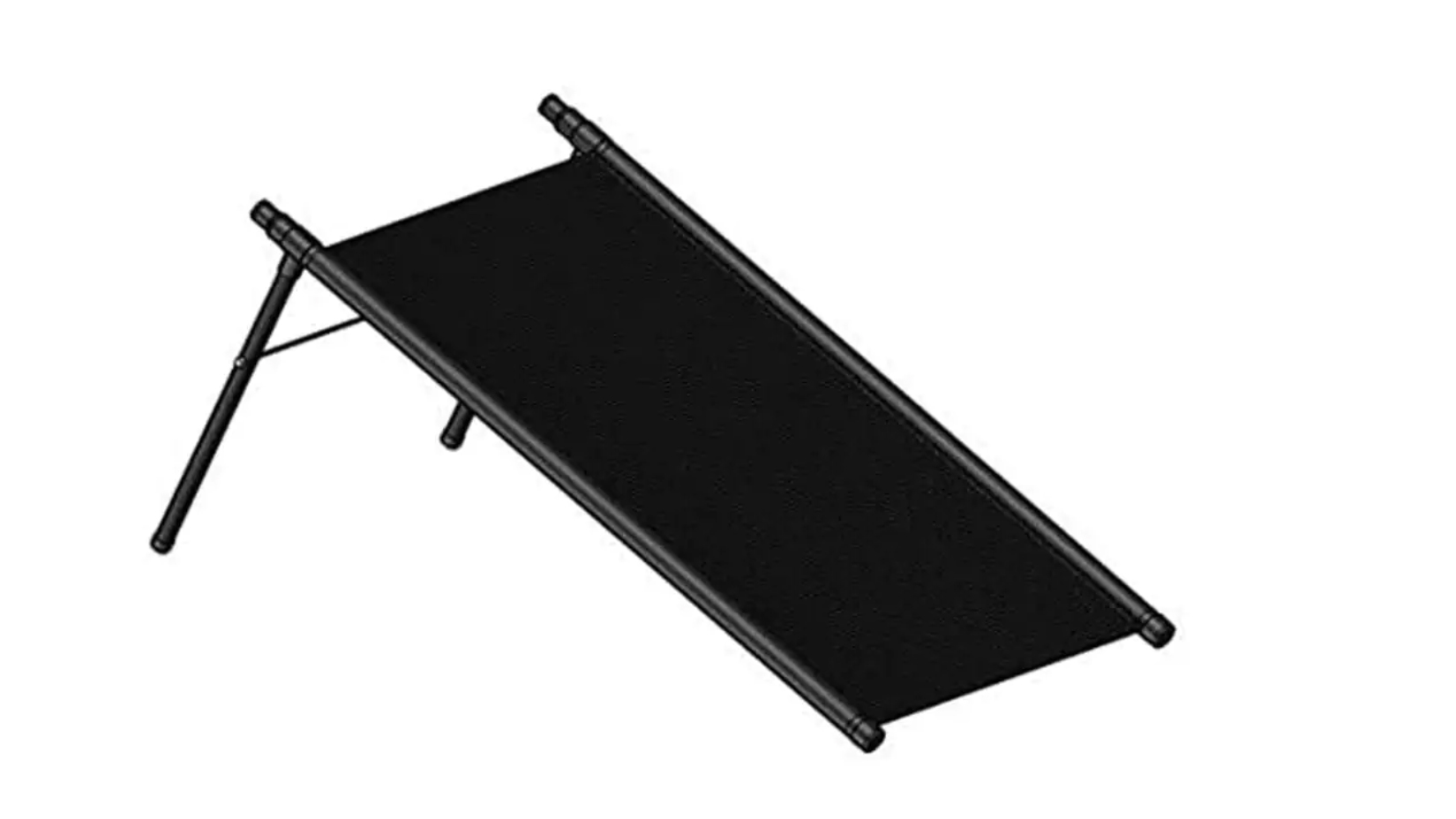
The Baby Bear Solar Power Heater System is undoubtedly the most affordable product in our guide. It’s cheap to buy, but being solar won’t increase your energy bills either. It’s capable of raising water temperature by a full 10 degrees using just the sun's heat, but of course, it’s worth pointing out that you’ll need to live in a sunny enough area to do its job effectively. The solar panel should be in direct sunlight for the warmest part of the day while the pump is running so that you can circulate the warming water into the pool.
Users gave the Baby Bear Solar Power Heater System 4.7 out of five stars on the Home Depot website. At the same time, Walmart received an even more complimentary 4.9 out of 5—although many reviews look to have been collected as part of a promotion. Overall, users were particularly pleased with the ease of installation, and one said that the heater warmed their pool by at least eight degrees.
This solar heater is one of the most sustainable options you can get, and from most outlets, it will come with a QR code to access the digital instruction manual, saving on paper, too. The heater can be used with above-ground and soft-sided pools, and it assembles quickly and easily compared to a gas or electric heater. It’s made from a sturdy plastic called polyolefin and designed with a circular channel to pump 20 gallons per minute with a maximum pressure of 3 pounds per square inch.
If you want to extend the use of your above-ground pool and swimming season from summer into the fall (without spending a fortune), the Baby Bear is a great choice. It’s best for small pools, though—check out the Fafco Solar Bear heating system if you want to warm a much larger pool.
The best tankless electric pool heater
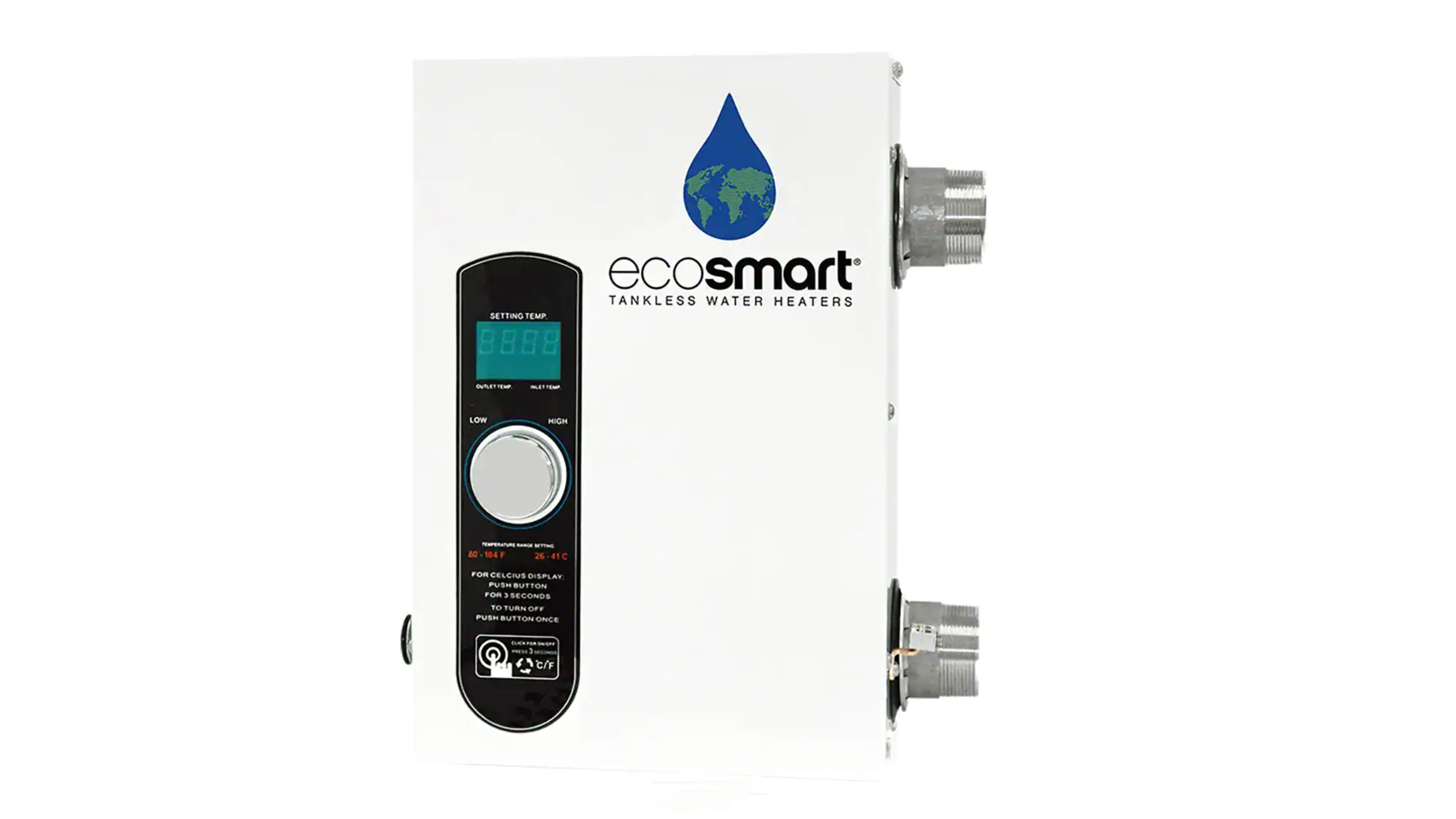
EcoSmart’s Smart POOL 18 electric pool heater is designed for indoor use and should be wall-mounted for the best results whether you want to install it for a new or existing pool. It can be used as a standalone pool heater or paired with another and used as a booster – great if you’ve already installed a heater but find it isn’t quite powerful enough.
The EcoSmart SMART POOL 18 Electric Tankless Pool Heater gets 3.3 out of 5 from over 200 reviews on Amazon and the same score at Home Depot. Among the main positives, users found the product more efficient than a tank model and were pleasantly surprised at how little electricity it drew. The main downsides listed were tech support and installation, which many felt was overcomplicated. Some also said that the box came with no instructions.
We love the precise temperature controls on this product. The compact, white heater sports a digital thermostat for setting the temperature exactly in 1-degree increments. You just use the LCD screen and silver dial, put it, and forget it. The 18,000W power and 61,149 BTU heating capacity can provide a 1° to 1.5° F temperature per rise per hour for pools smaller than 10,000 gallons.
EcoSmart Pool Heaters use clever flow sensors instead of pressure switch activation, which should reduce the risk of burned elements and ensure greater reliability. The heating elements are made from stainless steel, which makes them more durable. The EcoSmart Smart POOL 18 is cheaper than the gas heaters in our guide, but you’ll still probably need to pay for professional installation by an electrician and two forty-amp pole breakers to get it working.
This electric tankless heater isn’t powerful enough to heat big pools, but we’d easily recommend it as a booster in conjunction with another heater.
The best above ground pool heater
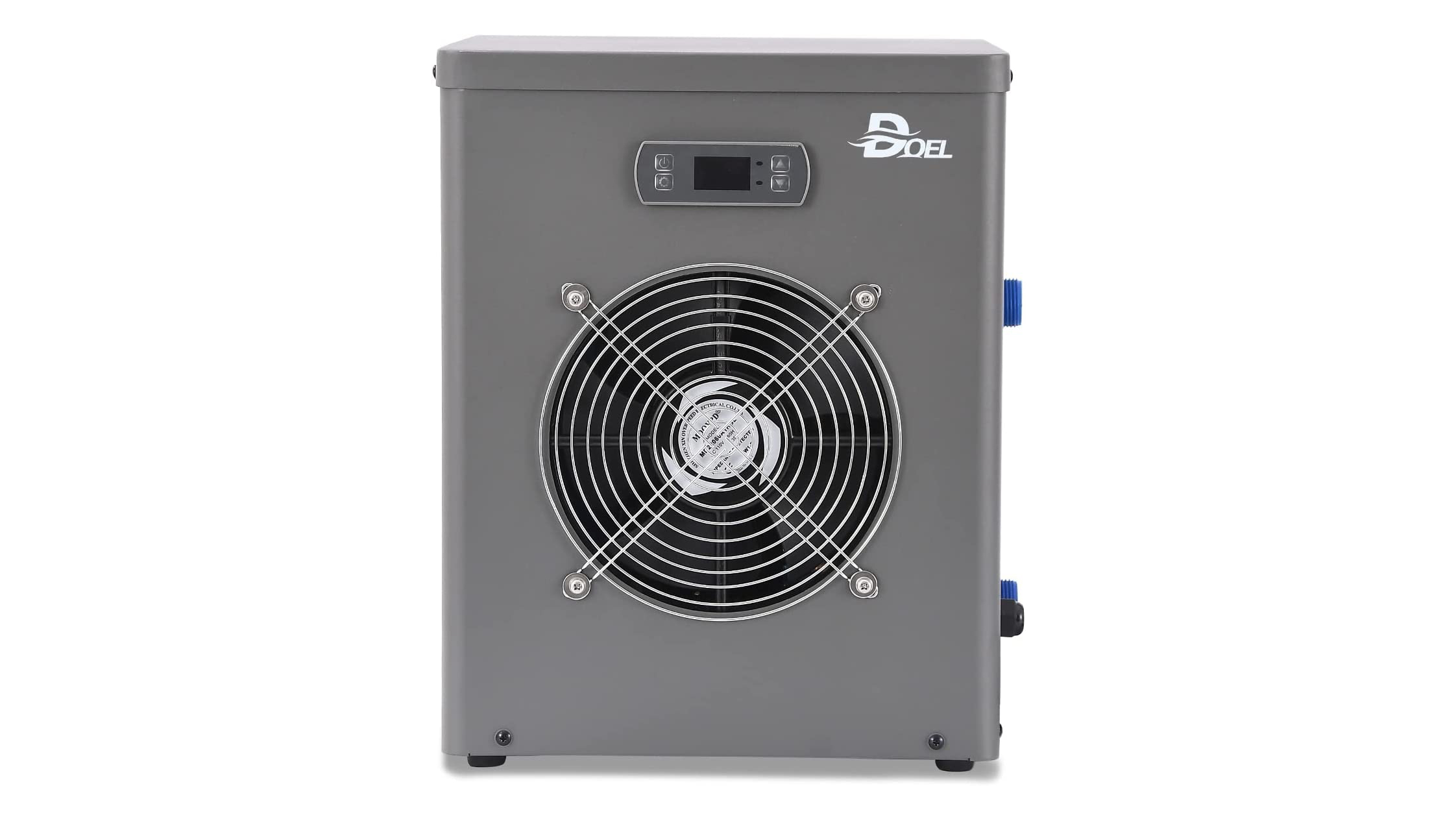
The DOEL 11800 BTU Mini swimming pool heat pump is designed for small pools up to 3962 gallons in size. Any larger than this, and it will take much longer to heat up. The unit can be used for above-ground pools, hot tubs, or spas and runs off an electric power supply of 110V, 60 HZ.
The DOEL 11800 gets mixed reviews from customers on Amazon, with a total of 3.3 out of 5. Some users found its performance patchy and reported that it had stopped working after several weeks, but others felt reassured that the unit comes with a two-year warranty in case of malfunction. One user summarizes the rest of the reviews accurately: “I don't strongly recommend the heater, but I wouldn't steer people away either.”
DOEL quotes that the operating cost is only 1/5 of an equivalent electric or gas heating system, and while we haven’t yet tested this, it makes sense.
The design is simple, grey, and boxy, but certainly not the least attractive in our guide or on the market. There’s a digital LED display to show the water temperature, while the galvanized stainless steel shell should help prevent corrosion and rust from water damage. What this unit does offer over others is great security. It has a child lock, an auto electrical leakage, and a low-voltage switch.
The beauty of this unit is its simplicity. There are two hose units for pumping the cold water in and warm water out, and the entire operation is powered by the built-in 8-foot-long power cable attached to a standard USA plug, which means that – unlike others in our guide – you can hook it up quickly and don’t need to wait for professional installation. If you want something more powerful than a solar heater but don’t want to commit to a gas heater, the DOEL 11800 BTU could be a suitable halfway option.
The best heater for larger pools
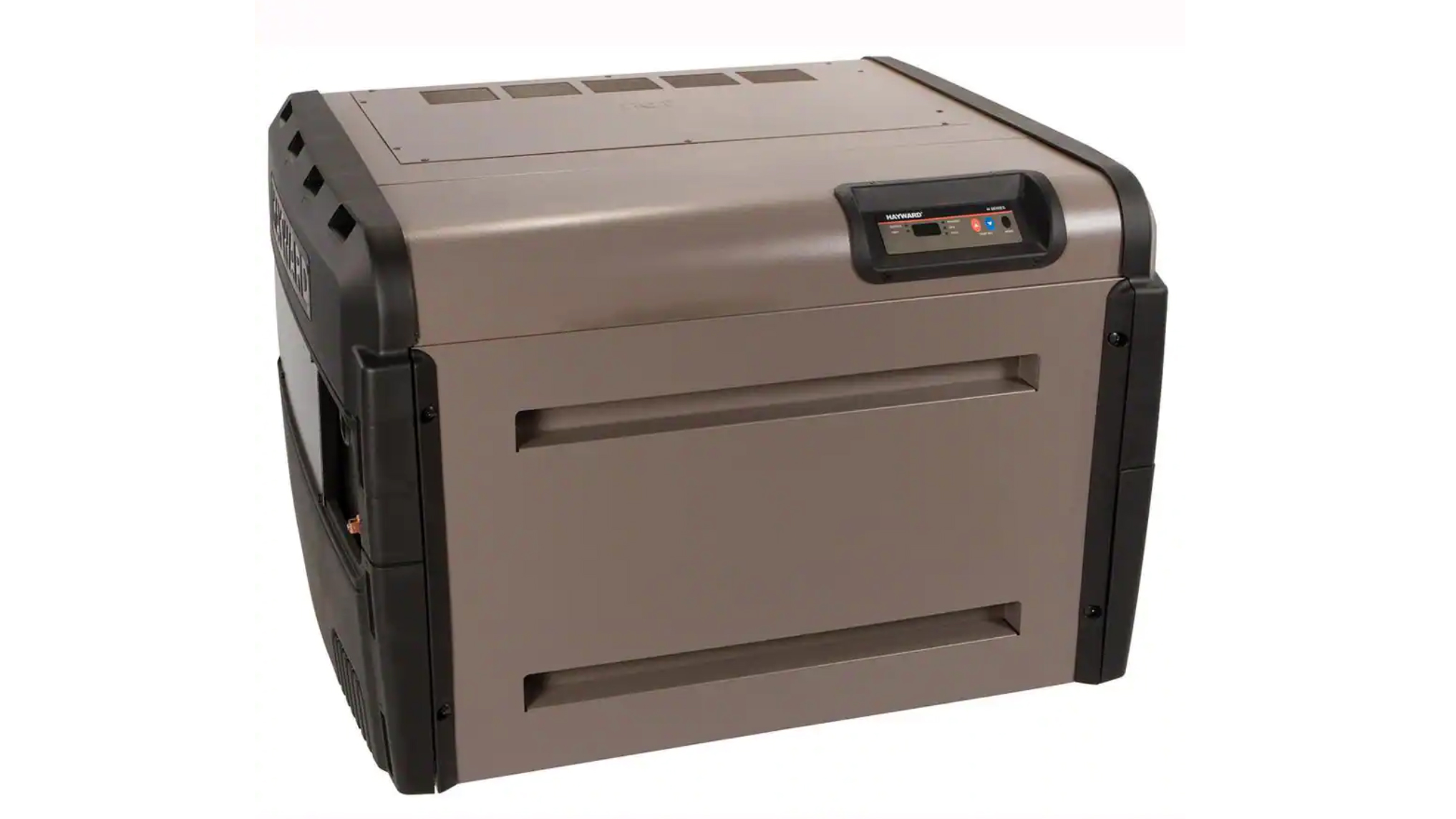
This Hayward natural gas heater is an energy-efficient but high-performing option for in-ground pools and spas up to 600 ft. in size. That’s partly thanks to its 150,000 BTU heat rating, which is higher than the majority in this guide. More expensive models in Hayward’s range max out at 400,000 BTU, and these are designed for professional or heavy-duty use as they can heat more water.
There aren’t many reviews of the Hayward Universal H-Series 150,000 BTU. While the brand is rated 4.1 out of 5 on the Home Depot website, the product is rated 2.8 out of 5 (but only from 5 reviews). Google reviews give it 4.5, with users praising its quiet operation when running and simple operation. Some found installation more difficult than a pump or filter but said the included documentation was detailed enough for installation information.
Like other heaters in this guide, the Hayward Universal H-Series features an easy-to-read digital control panel that makes light work of checking and changing the temperature. It can be installed inside or out. However, if you opt for indoor installation, you must purchase a vented top. The included manual will guide you through the process, but there’s a lot of plumbing involved, so a professional installer is recommended. We recommend factoring this into your buying decision if you’ve got a tight budget.
The Universal H-Series Heater has been rated highly for energy efficiency thanks to a patented bypass design that ensures better pump performance. A forced draft system moves air through the combustion chamber constantly and at a precise rate, which means that outside weather variables don’t affect its heating performance in a significant way.
The Hayward Universal H-Series is ideal if you have a natural gas supply and want a powerful heater for your pool, spa, or hot tub. It’s especially good for in-ground pools rather than above-ground ones.
How to choose the best pool heater for you
Picking the right pool heater for your needs is key, so knowing how to tell apart the different types and how they work is the best place to start. There are three basic types of pool heaters: gas pool heaters, electric pool heaters, and solar-powered pool heaters. Heat pumps are another type of pool heater, but they fall under the electric pool heater category.
The main difference between the three is that they all source their power differently. That has a knock-on effect on elements such as running costs, appropriate climates, and the complexity of the installation process.
Gas pool heaters
Like your home hot water heater, a gas pool heater is based upon combustion. It gets energy from burning natural gas or propane in a combustion chamber. The process heats water, which is fed through the heater, and warms your pool.
While gas pool heaters are the most powerful option out there, the process requires someone to specially install a gas line and an underground gas pipe. The installation costs can be pretty intimidating, especially if your pool is far from the closest gas source. As time passes, the running costs are also likely to be higher because the gas price is always fluctuating.
As powerhouses, gas pool heaters are the wisest option for heating pools that hold a large volume of water. They’re especially handy if you’re not planning on keeping your pool warm at all times, as they’re the speediest to warm up your pool, and in colder climates, more power is needed to heat icier pools. The only compromise is gas pool heaters aren’t as friendly to the environment as other solar or electric models.
Solar Pool Heaters
If you’re looking for an environmentally friendly option for heating your pool, a solar pool heater is a good choice. These heaters use natural energy sources, specifically solar collectors, that can pick up the sun’s thermal energy and use it to make your pool warm and toasty.
Besides being eco-friendly and economical, another big perk of solar pool heaters is their simple installation. Why? You don’t need to hook the heater up to an energy outlet. The panels do all the hard work for you and usually have little to no upkeep costs.
For your solar pool heater to work, you must position it somewhere with sufficient sunlight and out of the shade. They work best in hot climates with plenty of sunlight and take a little longer to warm your pool water than other pool heaters.
If you’re a fan of swimming at night, that may mean that you need to buy a diverter, which will add to the overall cost of your pool heater.
Electric Pool Heaters
Electric pool heaters are a popular choice for a reason. First and foremost, they’re incredibly efficient, and as a bonus, it doesn’t matter what time of year it is or the climate you live in. You’ll need to pay more upfront for an electric pool heater, but even though your monthly electricity bill might surge, it’s cheaper to run overall than a gas pool heater.
As for installation, electric heat pumps are more straightforward to install than gas pool heaters because there’s no need to connect them to a gas line. They use ambient temperature to heat your pool water, which isn’t as quick as using a gas energy resource, but they’re a cost-effective, eco-friendly pick overall.
Pool heater FAQs
What pool heater size do I need?
Whether you want a gas, electric, or solar pool heater, it's important to choose the correct size heater for your pool. Gas and electric heaters are measured in BTUs or British Thermal Units. That’s the energy it takes to raise one pound of water by one degree.
The more you raise the temperature, the more energy you need. One helpful calculator online can help you calculate the BTU you need in a pool heater. Consult a pool pro for more specific guidance.
Are pool heaters worth it?
Your ideal pool heater will be dictated by where you live and what heat source you have available, such as gas, an electric heater, or a solar pool heater – a good choice if you live in sunnier climates with regular sunshine.
Pool heaters with solar covers are usually cheaper in the long run and can help keep your costs down over the years. However, the initial outlay is usually slightly pricier than a standard electric pool heater.
Are pool heaters worth it? In our opinion, yes. Even if you live in a pretty warm and sunny state for most of the year, there will still be days when the water temperature is less than inviting. A good pool heater will ensure your home pool stays open year-round, so you can enjoy it much more and get your money’s worth.
How does a pool heater work?
Pool heaters work by taking cold water from the pool, heating it, and putting it back into it. They typically do that in one of two ways. A natural gas heater has a burner to heat the water, and an electric heat pump heater uses an evaporator coil that turns outside air into warmer air that it can then use to heat the water – a kind of reverse air conditioning. Heat pumps are slower than natural gas ones and work best in warm climates, but they're more efficient and tend to be cheaper to run.
There is a third kind, the electric immersion heater. It has a tank with the same kind of heating element you'll find in a tea kettle. However, such models tend not to be very powerful and aren't suited to large volumes of water. They're also much less efficient than heat pump models.
How much does a pool heater cost?
Prices vary, but at the time of writing, our current favorite pool heater is around $1,799 on Amazon. As with all heaters, the more heating power it delivers, the more you'll pay. For example, a similar model from the same manufacturer delivers 266,000 BTUs of power compared to 150,000, which increases the price by around $1,000.
There are more modestly powered options that cost a lot less: for example, a mini pool heater with 9,600 BTU costs just under $400. But with that lower price comes massively reduced heating power, and it wouldn't be appropriate for larger swimming pools.
It's important to consider running costs, too. Electric pumps can be relatively cheap compared to natural gas models: imagine a whole bunch of gas barbecues running at the same time, and you'll get the idea. A Weber gas grill delivers about 13,000 BTU of power, but some gas-powered swimming pool heaters deliver more than 250,000 BTU.
Can you add a heater to an existing pool?
Yes, you can. The cost and complexity will depend very much on the kind of heater you choose; for example, an electric heat pump model is relatively simple to connect but produces a lot of condensation, so you must consider drainage. A natural gas heater must be situated away from windows and doors because of the risk of fumes, and it will require a connection to a gas supply or tank. And solar swimming pool heaters will need room for the solar panels or a connection to existing ones.
Should I cover my pool heater in the winter?
Most pool heaters are designed to be out in most weather, but it's still a good idea to cover your heater in the months when you're not using it. However, you can't just chuck a tarp over it: many manufacturers recommend using a breathable cover because condensation and moisture can be trapped inside, where they can cause corrosion.

